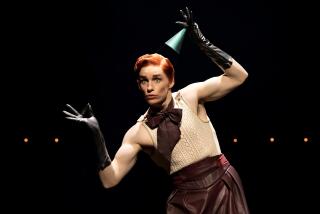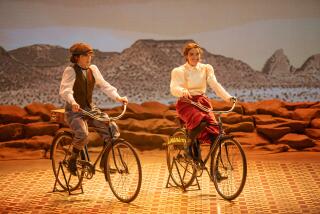Review: A Broadway first: In Danai Gurira’s harrowing ‘Eclipsed,’ the writer, director and stars are all women
Broadway, hardly a bastion of diversity, has been starting to see the wisdom in this “Hamilton”-rocked season of bringing new voices to the table.
“Eclipsed,” by the U.S.-born, Zimbabwean-raised Danai Gurira, represents the first time a Broadway play has been written and directed by and cast entirely with women. That these are black women makes this milestone only that much more remarkable.
The reward of a more diverse range of storytellers is a richer variety of stories, and “Eclipsed,” which stars Oscar winner Lupita Nyong’o (“12 Years a Slave”), tells a harrowing tale of women and war in Africa that brings a new globalism to the comfortably parochial Great White Way. (And, yes, it’s about time to retire that old moniker.)
SIGN UP for the free Gold Standard newsletter >>
This is one of two works in New York at the moment by Gurira, a playwright whose day job (acting) has already earned her fame. (Fans of AMC’s “The Walking Dead” will know her as the katana-wielding Michonne.) “Eclipsed” opened Sunday at the Golden Theatre in a production directed by Liesl Tommy. And “Familiar,” a more conventional family drama by Gurira about immigration and assimilation, had its off-Broadway premiere last week at Playwrights Horizons in a production directed by Rebecca Taichman.
“Eclipsed” is the more ambitious of the plays. Heralded last year off-Broadway at the Public Theater and presented at the Kirk Douglas Theatre in a different production in 2009, the drama, set largely in a makeshift shelter at a rebel camp during the 2003 Liberian civil war, focuses on a community of women wrestling with disastrous choices of survival.
It’s easy to miss Nyong’o when she first appears onstage. Playing a 15-year-old girl who’s been given sanctuary by two “wives” of a commanding general, she scurries about like a scared rabbit, darting under a tin tub whenever anyone threatens to enter the room.
Wife No. 1 (Saycon Sengbloh) and Wife No. 3 (Pascale Armand) want to protect this apparent orphan from the men in the camp. They know these warriors prefer young girls — Wife No. 3 taunts Wife No. 1 that she’s getting a little long in the tooth — and they don’t want to subject her at such a tender age to the sexual slavery they have come to accept as normal.
Gurira plunges us into the routines of these women. When they’re not submitting to the general’s lust, they cook, clean, gossip and bicker.
Girl, whose name seems to be a casualty of war, has the advantage of some education. She reads to the women a book about Bill Clinton’s presidency, a melodrama that captivates them, especially when “Monica, his No. 2” enters the story.
Nyong’o radiantly conveys the brightness and vulnerability of this girl, whose unmistakable potential throws into somber relief her dim prospects. (“I want to do sometin’ wit’ myself, be a doctor or member of Parliament or sometin’,” she says early on — heartbreakingly.) When she’s given the designation Wife No. 4, she accepts her fate with as much relief as resignation. At least she has an identity.
The return of Wife No. 2 (Zainab Jah), brandishing a firearm and carrying a bag of rice, unsettles the women. This former wife left the shelter to be a rebel fighter. She’d rather be an accessory of male violence than a victim of it.
Looking for a new recruit, Wife No. 2 lures the newcomer to join her. Step by soul-deadening step, she initiates the girl into the rites of warfare — murder, bondage, plundering, justifying these acts with the doctrine of destroy or be destroyed.
The outline of “Eclipsed” is boldly delineated: Girl must decide which path she will take to survive and therefore which part of herself she’s willing to let die. But the play unfolds episodically, in a series of scenes that can seem at points amorphous, especially in the second act.
The arrival of another character, Rita (Akosua Busia), a member of the Liberian Women Initiative for Peace who is looking for her daughter, presents the girl with a possible third option. Rita exhorts her to put down her weapon and come with her and the wives to a refugee camp. But with guns blazing in the distance, trust is hard to win.
The antagonist of “Eclipsed” is the hell that Liberia has become for women. But unlike “Ruined,” Lynn Nottage’s more Brechtian-inspired drama about Congolese sex workers whose lives have been similarly warped by war, Gurira’s drama occasionally meanders, losing momentum and character sharpness.
Tommy’s production, however, is exceptionally vivid. Clint Ramos’ scenic design and costumes lend the staging a modern urban sheen that reminds us of the global nature of contemporary Africa. Broken Chord’s original music and sound design and Jen Schriever’s lighting help maintain the intensity of the drama even when the writing goes slack.
Jah brings a tremendous ferocity to her role of the female warrior. Menacing those around her with her small yet pugnacious build, she’s like a gang leader who’s never more dangerous than when someone is appealing to her murdered conscience.
Sengbloh and Armand allow us to empathize with their characters without underplaying their foibles. Busia endows Rita with a maternal power that is at once a moral fury.
This is an ensemble piece, not a star vehicle, but Nyong’o can’t help standing out even as the girl becomes a fully fledged member of this unenviable community of war-ravaged women. Her plight is terrifying, and Nyong’o makes the tragedy achingly personal.
In many ways, “Familiar,” a play that comically explores what a high-achieving immigrant family renounced for American success, would seem an easier fit for commercial Broadway. There’s a wedding, a troublemaking visitor from the old country, snappy dialogue, lots of contrived liveliness and a big old secret that forces everyone to rethink their relationships.
Gurira first came to attention as a writer with “In the Continuum,” a performance piece she co-created with Nikkole Salter that looks at AIDS in two far apart yet not all that different communities, one in L.A., the other in Africa. In “The Convert,” Gurira explores colliding cultures and values in colonial Africa.
My disappointment with “Familiar” isn’t that it’s lighter fare but that it seems like a playwriting throwback — an audience-pleaser that’s all too willing to sacrifice subtlety for laugh track cackles. That “Eclipsed” is the Gurira play that made it to Broadway isn’t just history — it’s a promising sign of the future.
ALSO:
Review: ‘Thicker Than Water,’ a sitcom with a side of spaghetti at Theatre West
Review: In ‘Aubergine,’ Julia Cho turns choked-off emotions into a tale of sustenance
Review: Toil and trouble, and missed connections, in ‘Macbeth’ at Berkeley Repertory Theatre
More to Read
The biggest entertainment stories
Get our big stories about Hollywood, film, television, music, arts, culture and more right in your inbox as soon as they publish.
You may occasionally receive promotional content from the Los Angeles Times.







